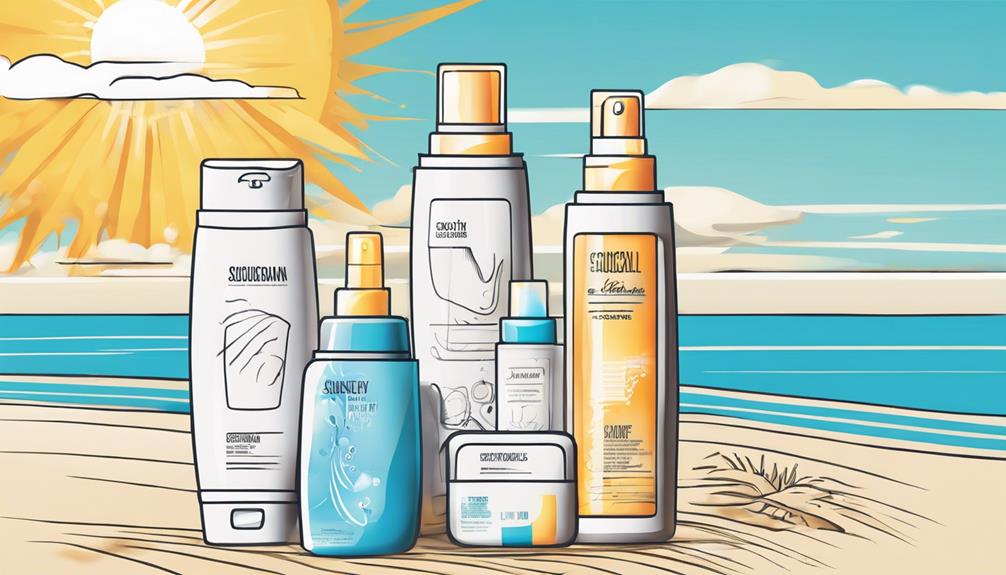The importance of sunscreen goes beyond just avoiding sunburns. It serves as a vital shield against harmful UV radiation that can lead to skin damage and various health concerns. Understanding the science behind sunscreen usage is crucial for maintaining healthy skin and preventing long-term consequences. As we delve into the depths of why sunscreen is a non-negotiable aspect of skincare, we uncover layers of protection that extend far beyond mere cosmetic benefits.
Key Takeaways
- Sunscreen prevents skin cancer, premature aging, and discoloration.
- Daily application reduces skin cancer risk by up to 50%.
- Shields skin from harmful UVA and UVB rays for long-term skin health.
- Choosing the right sunscreen type and SPF is crucial for optimal protection.
Importance of Sunscreen

The significance of sunscreen in protecting the skin from harmful UV radiation cannot be overstated, as it plays a crucial role in preventing skin cancer, discoloration, and premature aging. UV rays are known to be a leading cause of skin cancer, making daily sunscreen application essential for maintaining skin health. Even on cloudy days, UV rays can penetrate the skin, emphasizing the need for consistent protection. Skin cancer is a serious concern, and daily sunscreen use has been shown to reduce the risk by up to 50%. By forming a barrier against UV radiation, sunscreen not only shields the skin from potential harm but also helps in preventing premature aging signs caused by sun exposure. To ensure early detection of any skin changes or new spots, consulting a dermatologist is recommended. Therefore, incorporating sunscreen into a daily skincare routine is a proactive measure in safeguarding against the harmful effects of UV rays and maintaining healthy skin.
UV Protection and Skin Health
Protection against harmful UV radiation is essential for maintaining optimal skin health and preventing various skin conditions. UV radiation from the sun consists of UVA and UVB rays, which can penetrate the skin and cause damage at the cellular level. Prolonged exposure to these rays without protection can lead to serious consequences such as skin cancer, sunburn, and premature aging.
Regular use of sunscreen with a Sun Protection Factor (SPF) of 30 or higher is recommended by dermatologists to shield the skin from both UVA and UVB rays effectively. Sunscreen forms a protective barrier on the skin, reducing the risk of skin cancer by up to 50% when used consistently. Furthermore, sunscreen helps prevent photoaging, which manifests as wrinkles, discoloration, and loss of skin elasticity due to UV-induced damage to collagen and elastin fibers.
Incorporating sunscreen into daily skincare routines is crucial for maintaining skin health, preserving its youthful appearance, and reducing the long-term effects of UV exposure on the skin.
Sunscreen and Skin Cancer Prevention

Sunscreen plays a vital role in preventing skin cancer by shielding the skin from harmful UV rays. Daily application of sunscreen can significantly reduce the risk of developing melanoma and squamous cell carcinoma. Protecting the skin with sunscreen is a simple yet crucial step in maintaining skin health and lowering the chances of skin cancer.
Skin Cancer Risks
Amidst the escalating rates of skin cancer diagnoses, it is imperative to acknowledge the pivotal role of sunscreen in mitigating the risks associated with melanoma and squamous cell carcinoma. The Skin Cancer Foundation emphasizes that UV rays cause damage to the skin, leading to various skin cancers upon prolonged UV exposure. Melanoma, the deadliest form of skin cancer, can be reduced with regular sunscreen use. Studies show that sunscreen can lower the risk of squamous cell carcinoma by 40% and melanoma by 50%. As skin cancer rates continue to rise, applying sunscreen daily becomes crucial in protecting against the harmful effects of UV radiation and decreasing the chances of skin cancer development.
Sunscreen Protection
How does the consistent application of sunscreen contribute to the prevention of skin cancer, particularly melanoma and squamous cell carcinoma, in individuals exposed to UV radiation? Sunscreens play a crucial role in protecting the skin from the damaging effects of UV rays, ultimately reducing the risk of skin cancer. Here's why sunscreen protection matters:
- Sunscreen shields against harmful UV radiation, lowering the likelihood of skin cancer by up to 50%.
- Daily use of sunscreen aids in preventing melanoma, the most severe type of skin cancer.
- Regular application of sunscreen decreases the risk of developing squamous cell carcinoma by 40%.
Benefits of Wearing Sunscreen
Wearing sunscreen offers essential UV protection benefits, significantly reducing the risk of skin cancer and other harmful effects of sun exposure. The preventive measures of sunscreen extend to slowing down premature aging signs like wrinkles and age spots, contributing to maintaining healthy and youthful skin. Additionally, sunscreen aids in fading scars, preventing skin discoloration, and shielding against blue light exposure, crucial for overall skin health maintenance.
UV Protection Benefits
The application of sunscreen offers substantial UV protection benefits, including a reduction in the risk of skin cancer and premature aging caused by harmful UV radiation. Utilizing sunscreen with a high Sun Protection Factor (SPF) shields the skin from UVA and UVB rays, providing broad-spectrum protection. Here are key points highlighting the advantages of sunscreen:
- Regular sunscreen use can lower the risk of squamous cell carcinoma by 40% and melanoma by 50%.
- Sunscreen helps prevent skin discoloration, wrinkles, and age spots caused by UV exposure.
- Daily application of SPF 15 or higher sunscreen is recommended for all individuals to maintain skin health.
Skin Cancer Prevention
Unquestionably, the consistent application of sunscreen plays a pivotal role in preventing skin cancer by effectively shielding the skin from harmful UV rays and minimizing the risk of DNA damage that can lead to the development of skin cancer. Regular sunscreen use, especially with SPF 30 or higher, significantly decreases the chances of skin cancer caused by sun exposure. Studies have shown that wearing sunscreen daily can reduce the risk of developing melanoma by 50% and squamous cell carcinoma by 40%. By incorporating sunscreen into daily skincare routines, individuals can protect themselves from sun damage and lower the likelihood of skin cancer. Therefore, sunscreen should be considered a fundamental aspect of maintaining skin health and preventing the harmful effects of UV radiation.
Sun Damage and Aging

Exposure to sunlight plays a significant role in the acceleration of skin aging processes by causing damage to essential skin components such as elastin, collagen, and skin cells. This damage is primarily attributed to the harmful effects of UV rays, which penetrate the skin and lead to premature aging signs like wrinkles, fine lines, and age spots. To combat these detrimental effects, daily sunscreen use is crucial. Here are three key points to consider regarding sun damage and aging:
- UV rays contribute to the breakdown of collagen and elastin fibers in the skin, resulting in sagging, wrinkles, and loss of firmness.
- Skin exposed to the sun without protection is more prone to developing age spots and uneven pigmentation due to melanin production irregularities.
- Consistent use of sunscreen not only helps prevent photoaging but also reduces the risk of skin discoloration and maintains a more youthful appearance over time.
SPF and Sunscreen Efficacy
Prolonged exposure to sunlight necessitates understanding the significance of SPF values in sunscreen products for effective protection against harmful UV rays. SPF (Sun Protection Factor) primarily indicates a sunscreen's ability to shield the skin from UVB rays, the main cause of sunburns and skin cancer. It's essential to note that while UVB rays damage the outer layer of the skin, UVA rays penetrate deeper, contributing to skin cancer and premature aging. Opting for a broad-spectrum sunscreen is crucial as it offers protection against both UVB and UVA rays, ensuring comprehensive defense against sun damage. Adequate application of sunscreen is key to its efficacy; a thin or uneven application may result in reduced protection. By grasping the distinction between UVA and UVB rays and choosing the right broad-spectrum sunscreen with an appropriate SPF, individuals can better safeguard their skin against the harmful effects of the sun.
| SPF Value | UVB Protection | Recommended Application Frequency |
|---|---|---|
| SPF 15 | 93% | Every 2 hours |
| SPF 30 | 97% | Every 2 hours |
| SPF 50 | 98% | Every 2 hours |
| SPF 100 | 99% | Every 2 hours |
Types of Sunscreen Products

In discussing the various types of sunscreen products available, it is important to understand the distinctions between mineral, chemical, and combination sunscreens for effective sun protection.
Types of Sunscreen Products:
- Mineral Sunscreens: These formulations contain zinc oxide or titanium dioxide, providing physical protection by reflecting and scattering UV rays away from the skin. They are ideal for individuals with sensitive skin due to their gentle nature.
- Chemical Sunscreens: These sunscreens work by absorbing UV rays and converting them into heat, reducing the amount of radiation that penetrates the skin. They are often preferred for their lightweight and easy-to-blend consistency.
- Combination Sunscreens: Combining the benefits of mineral and chemical filters, these sunscreens offer broad-spectrum protection against both UVA and UVB rays. They provide a comprehensive approach to sun protection, catering to various preferences and skin types.
Understanding the differences between these sunscreen formulations can help individuals make informed choices to safeguard their skin effectively.
Application of Sunscreen
Moving from understanding the distinctions between mineral, chemical, and combination sunscreens, the application of sunscreen plays a crucial role in ensuring effective protection against harmful UV radiation. Applying sunscreen 30 minutes before being exposed to the sun allows for optimal absorption, creating a barrier against UV rays. Reapplication every two hours, regardless of cloud cover, is essential to maintain its effectiveness. Covering all exposed skin areas, including commonly missed spots like ears and scalp, is crucial for comprehensive protection. Don't overlook your lips, as they are prone to sun damage and skin cancer. Using a water-resistant sunscreen is vital for outdoor activities or swimming to ensure continuous sun protection.
| Application Tips | Importance |
|---|---|
| Apply 30 minutes before sun exposure | Optimal absorption |
| Reapply every 2 hours | Maintain effectiveness |
| Cover all exposed skin areas | Comprehensive protection |
| Don't forget lips and scalp | Prevent sun damage |
| Use water-resistant sunscreen | Ensure continuous protection |
Sunscreen for Different Skin Types

Different skin types require specific considerations when it comes to choosing the right sunscreen. From oily to sensitive skin, each type has unique needs that should be addressed for optimal protection against UV rays. Factors such as SPF recommendations, sunscreen formulation, and compatibility with different skin types play a crucial role in ensuring effective sun protection.
Skin Type Variations
Optimal protection against sun exposure necessitates tailored sunscreen formulations based on individual skin types. When it comes to sunscreen for different skin types, specific considerations are vital. Here are essential points to keep in mind:
- Oily skin benefits from oil-free, non-comedogenic sunscreens to prevent breakouts.
- Dry skin requires sunscreen with added moisturizing ingredients to prevent further dryness.
- Sensitive skin needs mineral-based sunscreens with gentle, hypoallergenic formulas to avoid irritation.
Understanding these variations aids in selecting the most suitable sunscreen for each skin type, ensuring effective protection against the sun's harmful rays.
Sunscreen Selection Tips
What key considerations should guide the selection of sunscreen based on individual skin types to ensure effective protection against the sun's harmful rays? Choosing the best sunscreen for different skin types is crucial for adequate sun protection. For oily skin, opt for oil-free, non-comedogenic sunscreens to prevent breakouts. Dry skin benefits from moisturizing sunscreens that contain hydrating ingredients. Sensitive skin requires fragrance-free and hypoallergenic sunscreens to avoid irritation. Combination skin can benefit from lightweight, broad-spectrum sunscreens that cater to various skin needs. Understanding your skin type and its specific requirements will help you select the most suitable sunscreen that provides both protection and comfort. By choosing the right sunscreen formulation, you can ensure that your skin is shielded from the sun's harmful UV rays.
SPF Recommendations
To ensure effective protection against the sun's harmful rays, selecting the appropriate SPF level tailored to individual skin types is essential for maintaining skin health and preventing sun damage. When considering SPF recommendations, here are some key points to remember:
- SPF 30: Suitable for daily use on all skin types.
- SPF 50 or Higher: Beneficial for individuals with fair skin.
- SPF 15 or Above: Necessary even for darker skin tones to ensure adequate protection.
For sensitive skin, opting for mineral-based sunscreens containing zinc oxide or titanium dioxide can be less irritating. Additionally, water-resistant sunscreens are ideal for all skin types, especially during outdoor activities where sweat and water exposure are common. By adhering to these guidelines, individuals can better safeguard their skin from the sun's damaging effects.
Sunscreen for Daily Use

Consistently applying sunscreen daily is imperative for safeguarding the skin against UV radiation and maintaining its health and appearance. Daily sunscreen use is crucial in protecting your skin from the harmful effects of UV rays, which can lead to skin damage and increase the risk of skin cancer. By forming a barrier on the skin, sunscreen helps prevent UV rays from penetrating and causing harm. This protection is essential not only for preventing skin cancer but also for reducing the signs of premature aging, such as wrinkles and age spots.
It is a common misconception that sunscreen is only necessary on sunny days. However, UV rays can still penetrate through clouds and windows, making it important to wear sunscreen every day, regardless of the weather conditions or indoor/outdoor activities. To maximize the benefits of sunscreen, choose a product with at least SPF 15 and apply it generously to all exposed skin. By incorporating daily sunscreen into your skincare routine, you can effectively shield your skin from potential damage and maintain its health and vitality.
Sunscreen and Weather Conditions
When considering the impact of weather conditions on the efficacy of sunscreen application, it is crucial to acknowledge that 80% of the sun's rays can penetrate through cloud cover, underscoring the necessity of consistent sun protection measures. Even on cloudy days, UV rays can reach the earth's surface, highlighting the need for sunscreen to protect the skin. Sunscreen every two hours is essential to ensure continuous protection from harmful UV radiation, regardless of cloud cover. The sun's rays can still cause damage even when the sun is not visible, making sunscreen a vital safeguard in various weather conditions. Whether in winter or summer, sunscreen is a crucial defense against skin damage caused by UV exposure. To protect the skin adequately, sunscreen application is imperative when engaging in outdoor activities like skiing in winter or spending time at high elevations where UV rays are stronger. Remember, the skin requires protection against UV rays year-round to maintain its health and prevent sun damage.
Reapplication of Sunscreen

Given the inevitable degradation of sunscreen effectiveness over time and the persistent threat of UV radiation exposure, the regular reapplication of sunscreen stands as a fundamental pillar in maintaining robust protection against skin damage. It is crucial to reapply sunscreen every two hours to ensure continued defense against harmful UVA and UVB rays. Factors such as swimming or sweating can diminish the efficacy of sunscreen, necessitating more frequent application to maintain protection levels. Failure to reapply sunscreen can lead to inadequate coverage and an increased risk of skin damage due to prolonged exposure to UV rays. Consistent reapplication helps counteract the effects of environmental factors and ensures that the skin remains shielded from the harmful effects of the sun.
| Reapply Sunscreen | Maintain Protection | UV Rays | Increased Risk |
|---|---|---|---|
| Every two hours | Essential for defense | Harmful effects | Skin damage |
Sunscreen Myths Debunked
Debunking common misconceptions surrounding sunscreen is crucial for promoting accurate understanding of its necessity in daily skincare routines and overall skin health. When it comes to sunscreen myths, it's important to separate fact from fiction to ensure optimal protection against harmful UV radiation. Here are three key myths debunked:
- Sunscreen Prevents Vitamin D Production: While sunscreen blocks some UV rays, it does not completely inhibit the body's ability to produce Vitamin D. It is still possible to get enough Vitamin D through diet and supplements while using sunscreen.
- Sunscreen Causes Acne: Contrary to this belief, many sunscreens are now non-comedogenic, meaning they do not clog pores. Choosing the right sunscreen for your skin type can help prevent breakouts.
- Sunscreen is Unnecessary on Cloudy Days: UV radiation can still penetrate clouds and cause skin damage. Using sunscreen daily, regardless of the weather, is essential for protecting against skin cancer, premature aging, and other UV-related skin issues.
Sunscreen as a Skin Care Essential

Sunscreen stands as a fundamental component of skincare regimens due to its crucial role in shielding the skin from detrimental effects of UV radiation. UV light poses a significant risk to skin health, leading to various issues such as premature aging, skin cancer, and discoloration. Regularly wearing sunscreen is a key preventive measure recommended by Board-Certified Dermatologists to maintain a healthy skin care routine and reduce the risk of skin damage. By incorporating sunscreen into daily skincare routines, individuals can effectively protect their skin from harmful UV rays and minimize the development of wrinkles, age spots, and sun spots. The table below summarizes the importance of sunscreen in skincare:
| Benefits of Sunscreen |
|---|
| Shields from UV radiation |
| Prevents premature aging |
| Reduces skin cancer risk |
Frequently Asked Questions
Why Is It Important to Wear Sunscreen?
The importance of wearing sunscreen lies in its ability to protect against harmful UV rays, reducing the risk of skin cancer, premature aging, and sunburn. UV rays can lead to skin damage and increase the likelihood of developing skin cancer. By applying sunscreen regularly, individuals can safeguard their skin from these detrimental effects, promoting healthier and more youthful skin in the long term.
What Happens if You Don T Wear Sunscreen?
Not wearing sunscreen can result in various adverse effects on the skin. Exposure to harmful UV radiation without protection can lead to increased risks of skin damage, premature aging, skin cancer, sunburn, and hyperpigmentation. Failure to use sunscreen allows these damaging effects of UV rays to penetrate the skin, causing long-term harm. Protecting the skin with sunscreen is essential to prevent these negative consequences and maintain skin health.
Do You Really Need Sunscreen Every Day?
Ensuring optimal skin health necessitates daily protection against harmful UV rays, crucial in preventing premature aging and reducing the risk of skin cancer. Regardless of weather or location, consistent sunscreen application is paramount. Shielding the skin from UV damage through daily sunscreen use is recommended for individuals of all skin types and tones, as it plays a pivotal role in overall skin health maintenance and safeguarding against sun-induced skin ailments.
What Is the Purpose of a Sunscreen to Protect?
Sunscreen serves as a vital shield against skin damage caused by harmful UV rays, aiding in the prevention of premature aging, skin cancer, and sunburns. Its protective barrier mitigates the adverse effects of UV radiation, reducing the risk of developing skin-related ailments. Consistent application of sunscreen, especially with SPF 30 or higher, is paramount for safeguarding the skin from discoloration, wrinkles, and other sun-induced imperfections.
Conclusion
In conclusion, sunscreen plays a crucial role in protecting our skin from harmful UV rays, preventing skin damage, discoloration, and premature aging. One interesting statistic to note is that studies have shown that regular sunscreen use can reduce the risk of developing skin cancer by up to 50%. With the detrimental effects of UV radiation on skin health, incorporating sunscreen into our daily skincare routine is essential for maintaining overall well-being and preventing long-term damage.
